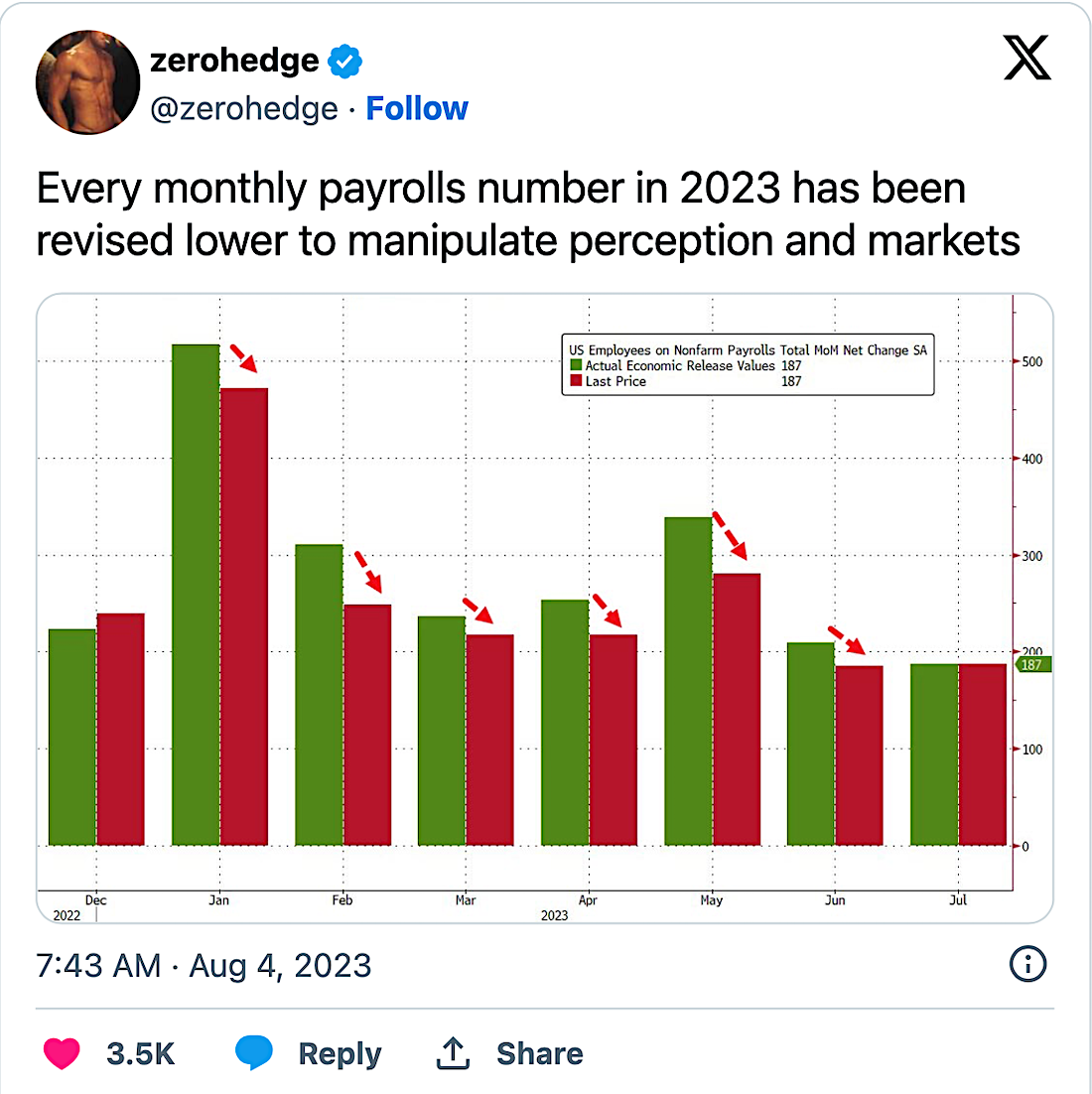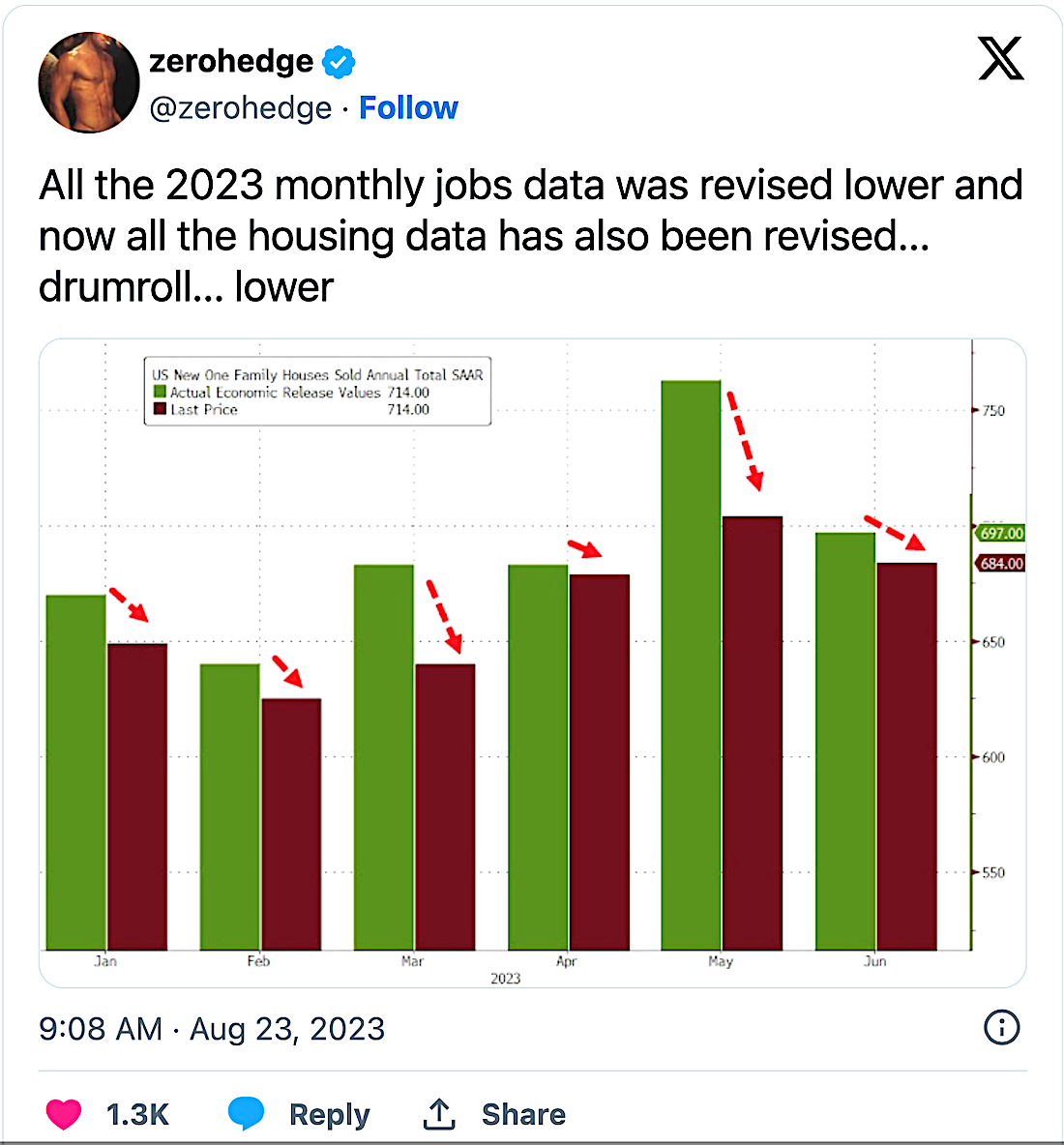I guess we shouldn’t be surprised when a federal agency is politicized. Better we should be surprised to find one that isn’t. Now, the Bureau of Labor Statistics (to be fair, the Department of Labor generally) has been enlisted in the Biden/Newsom re-election campaign. ZeroHedge and Kevin Roche have been on this case for a while. Kevin summarizes:
For several months I have following, directly in the Bureau of Labor Statistics releases and in Zero Hedge posts, the saga of the incredible shrinking initial jobs data releases, which look great on the initial release and are inevitably revised downward (or upward, depending on which way means it got worse) in succeeding months. That can’t go on forever without someone noticing and eventually having to make a big correction. And the most recent release today of the JOLTS (Job Openings and Labor Turnover Survey) report had a spectacular downward revision of job openings. It typically isn’t just the past month that gets revised; it is multiple past months. So to get a true sense of the scale of the change you have to look back at all revisions.
***
There is no way this pattern does not reflect intentional release of misleading data to boost the public perception of how Mr. Senile has managed the economy and help his non-existent re-election campaign. And I keep asking myself when Republicans are going to make a big stink out of this because they should.
The linked ZeroHedge post has lots of data with charts and graphs. This one shows the repeated downward revisions in monthly jobs data by BLS:

The Biden administration is doing it with housing numbers, too:

There is much, much more at the link. The bottom line, in my opinion, is that you can’t trust any information that comes out of the federal government, including that which seems to be the most objective and, in former times, non-controversial. Everything is being gamed.
STEVE comments: I have a small dog in this controversy, at least indirectly. When the BLS was formed to produce official statistics on unemployment and related matters, back in the 1930s I believe, there were doubts about the veracity of the enterprise, and worries about potential political abuse. It took a while before BLS numbers were regarded as credible, and I know that the career economists at BLS who do these numbers every month take their task seriously, and try to avoid political bias. At least they used to.
I know something of this history because starting in the 1990s I advocated several times, including in front of congressional committees, that the U.S. should have a Bureau of Environmental Statistics modeled after BLS. Believe it or not the U.S. is the only advanced industrial democracy that does not have such an agency to compile and report general environmental data. A lot of data is collected by individual agencies, but good luck getting a handle on it all, as it is often buried deep inside agency bureaucracies, and there is no standardization for data quality, reporting, etc.
Environmental groups uniformly oppose this initiative for a simple reason—most environmental trend data in the U.S. is strongly positive, and environmentalists hate good news, and in fact depend on bad news, or the ability to distort the facts, for their clout. But one day in a hearing an environmentalist opposing the idea let it slip: “We don’t trust who would be compiling and reporting the data.” (This was during the George W. Bush administration.)
Me: “But you trust BLS statistical reports on the labor market don’t you?”
Enviro: <Silence>
I agree with John that the House should hold some hearings on this strange pattern, and encourage whistleblowers to come forward about any potential interference, whether any career employees have made subtle changes to the methodology, whether White House officials have any input into the process, or have been involved with the hiring of any BLS staff. Any committee ought to consult with some expert economists first about how to go about this inquiry, so the hearing isn’t a wandering fishing expedition, or easily bamboozled with econobabble about “unit root” statistics or something.
And we should be open to the hypothesis that in the post-COVID period, the usual estimation methods simply don’t work, and initially overestimate employment changes that have a bias that is only revealed when more data becomes available. Back in the 1990s some conservative economists made the case that we were measuring inflation incorrectly (a debate that continues), and some changes were made to the CPI, PPI, etc. Have there been any changes—or lack of changes—in the BLS methodology to keep up with our changing labor market (things like the “gig” economy, for example)? If this is the case, the BLS should explain this clearly and comprehensively, and the monthly results properly discounted.
Another idea: As I and others have advocated in the realm of climate science, we ought to consider a “Team B” exercise, in which a group of outside economists are given the same raw data and the modeling code that the BLS uses, and see whether they come up with different results.
These continuing inaccuracies, all in one direction, don’t just have political consequences: they are also moving markets, which has real world economic consequences for Americans (especially interest rates). At a time when public confidence in government institutions continues to fall—with good reason—the burden of proof is on agencies like the BLS to explain why they are doing their job right.
Notice: All comments are subject to moderation. Our comments are intended to be a forum for civil discourse bearing on the subject under discussion. Commenters who stray beyond the bounds of civility or employ what we deem gratuitous vulgarity in a comment — including, but not limited to, “s***,” “f***,” “a*******,” or one of their many variants — will be banned without further notice in the sole discretion of the site moderator.